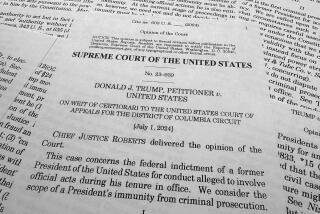Criminals Lie Low in Parliament
- Share via
MOSCOW — In a land where organized crime is posing one of the greatest threats to elected government, a variety of suspected criminals and thugs have discovered the best way to avoid arrest and prosecution: Win a seat in the Russian parliament.
Under Russia’s 6-year-old constitution, no member of parliament can be prosecuted while in office--even for crimes that have nothing to do with parliamentary affairs.
“A deputy in Russia is like a deity--he is absolutely untouchable,” said Alexander I. Gurov, a former top police investigator. “Deputies are free to do anything they want, knowing they will hardly ever be held accountable. Even if they commit a household murder, they will still be immune from prosecution.”
After seeing lawbreakers he once pursued appear on television to promote their candidacies for the Duma, Gurov decided that he also would run for parliament’s lower house, campaigning on the immunity issue. He is among more than 6,000 candidates running for the 450-seat Duma in elections to be held Dec. 19. Some lawmakers and law enforcement officials estimate that between 5% and 30% of this year’s candidates have criminal records or connections.
“Today the criminal world has launched an onslaught on the parliament,” Gurov said.
The constitutional protection against prosecution originally was intended to guarantee the political independence of the legislative branch and ensure that the executive government could not arrest its parliamentary critics. Instead, it has contributed to the criminalization of parliament, as crime figures have found a haven as deputies in the Duma.
Despite the desire of many Russians to build a Western-style democracy, parliamentary immunity has proved to be a significant barrier to the establishment of a society ruled by law.
“This grant of immunity has never fulfilled its role of political protection for legislators but, on the contrary, has contributed to creating the image of a corrupt Russia for the rest of the world,” said Konstantin N. Borovoi, an independent deputy in the Duma.
Interior Ministry spokesman Alexander V. Tolkachev said federal police reviewed this year’s candidates for the Duma and found that 105 had been convicted of a crime. Four more are wanted by police.
“On the whole, criminal groups have become much more active during this election campaign than they were in the 1995 elections,” he said. “They have accumulated enough capital and acquired enough influence that they are now afraid to lose.”
With the help of police, election officials have removed a few of the most notorious candidates from the ballot on technicalities. For example, officials disqualified Sergei Mikhailov, the reputed head of Russia’s largest criminal group who spent 26 months in a Swiss jail before winning acquittal in 1998 on money-laundering charges. He was taken off the ballot ostensibly because he has a Greek passport as well as a Russian one.
Similarly, officials rejected the candidacy of Anatoly P. Bykov, an aluminum magnate from Siberia who fled Russia last spring just before he was charged with murder and corruption. Arrested in Hungary in October, he was removed from the ballot for failing to report ownership of a house, as required.
Nevertheless, experts estimate that hundreds of lesser-known candidates seeking immunity from prosecution--and perhaps a chance to further their criminal agendas in parliament--have slipped past election officials to land on the ballot.
Murder Charges Don’t Slow Campaign
One candidate who has not been disqualified is Yuri Shutov, a St. Petersburg politician who is running for office from his jail cell. He was arrested in February on charges of involvement in the murders of at least four prominent St. Petersburg businessmen and government officials, including a bank chairman and a city administrator. He also is accused of attempted murder, assault, arson, theft and being the leader of an organized crime group. His supporters say the charges are politically motivated. If he wins election, he will be freed from jail.
One deputy running for reelection is singer Iosif D. Kobzon, sometimes called Russia’s Frank Sinatra. He was denied a visa to enter the United States in 1995 because of FBI reports allegedly linking him to organized crime, but he has not been prosecuted in Russia.
“It is an open secret that for many deputies, winning election is an automatic guarantee that their problems with law enforcement bodies are solved,” said Moscow sociologist Igor M. Klyamkin. “This is probably one of the most reliable ways of guaranteeing a person a quiet and happy life for four years.”
In U.S., Immunity Is Strictly Limited
In the United States, members of Congress receive a strictly limited form of immunity. They are constitutionally shielded from libel or slander lawsuits for anything they say during congressional debate or write in official reports, but they can be arrested and prosecuted for alleged crimes.
In Russia, the constitution gives members of parliament blanket immunity throughout their tenure: “A deputy may not be detained, arrested, [or] searched except when detained in the act of perpetrating a crime, and may not be subject to personal search except when such search shall be authorized by law to ensure the safety of other people,” it says.
The rule applies not only to the Duma but to the 178-seat Federation Council, the upper house of parliament, whose members include the mayor of Moscow and all of the nation’s regional governors.
While a lawmaker’s immunity can be revoked under certain conditions, law enforcement officials face enormous difficulties in building a case against a member of parliament. Police interpret the immunity clause as a prohibition against opening an investigation into a deputy’s activities or questioning a legislator in a criminal case. As a result, it is almost impossible to gather enough evidence to make the case that a lawmaker’s immunity should be revoked.
Under the constitution, parliament can lift individual immunity by a simple majority if asked to do so by Russia’s prosecutor general. Generally, however, lawmakers are reluctant to revoke a colleague’s immunity because of the dangerous precedent it could set for themselves.
Only twice has parliament voted to remove a lawmaker’s immunity, and both times the circumstances were unusual. One case involved Sergei Mavrodi, the head of an infamous pyramid-scheme company called MMM that stole money from thousands of investors, including some deputies. Mavrodi never even bothered to attend Duma sessions. The other concerned radical separatist Nadir Khachilayev, who was accused of fomenting rebellion in his home republic, Dagestan.
“Both were hated by the deputy corps,” said Pavel G. Bunich, an economist and Duma member. “Both of them were simply outrageous cases.”
While deputies with legal problems are protected from prosecution, they are not immune to political manipulation, particularly by factions that have access to government files and agencies. Bunich cited the case of an independent deputy who began having problems with the tax authorities. He joined a pro-government Duma faction, and his tax problems were resolved.
Topic Surfaces in Parliament Races
In recent weeks, parliamentary immunity has come under attack and become an issue itself in the Duma campaign.
Alexander I. Solzhenitsyn, a Soviet-era dissident and winner of the 1970 Nobel Prize for literature, recently called for an end to immunity, saying it fosters corruption at the highest levels.
“Such a wonderful shelter must not be offered to abundant thieves and outright criminals, especially in our times of rampant crime,” he said in a television interview.
Candidates of the Union of Right Forces political party, headed by former First Deputy Prime Minister Boris Y. Nemtsov, are campaigning for the Duma this fall on a plank of eliminating the parliamentary shield. Around Moscow, Nemtsov’s face is plastered on billboards with the slogan “Drop Immunity.”
Irina M. Khakamada, another Union of Right Forces leader and candidate, estimated that nearly one-third of Duma contestants have criminal ties.
“I am running in a St. Petersburg constituency where at least three of my 14 opponents are either criminals or very closely connected to the criminal world,” she said. “They are very tough competition.”
Criminal candidates have the distinct advantage of being able to use money they stole from the electorate to convince the voters to put them in office.
“One of them controls the food market in the district, and he lowered prices for vegetables, a fact which all the grannies in the vicinity were duly informed of in a leaflet,” Khakamada said.
Running against members of the mob, Khakamada said, has made campaigning dirtier than ever. One rival threatened the lives of her campaign workers and tried to blackmail her by threatening to smear her reputation, she said.
“If not for the immunity clause, I would be competing with fellow politicians,” she said. “But the way things are, I have to take on gangsters, and it is very time-consuming, way too expensive, humiliating and dangerous in the bargain.”
Among the Duma contestants are two well-connected Kremlin insiders, tycoons Boris A. Berezovsky and Roman A. Abramovich, who are considered to have exceptional influence over President Boris N. Yeltsin and his family.
Both are running in districts far from Moscow and dominated by non-Russian ethnic groups, where the number of voters is relatively smaller and campaign spending will be most effective. Some critics say they are seeking seats in the Duma to gain immunity as insurance against the possibility of a shift in their fortunes next year, when Yeltsin is scheduled to step down.
Warrant Issued for Tycoon While Abroad
Indeed, immunity would have come in handy earlier this year for Berezovsky when a warrant for his arrest on money-laundering charges was issued while he was in France. The warrant was later withdrawn, and the investigation into his activities was closed early last month, just in time for him to qualify for the ballot.
Berezovsky denies that he is running for the Duma to gain protection from prosecution and says he will push to abolish the deputies’ immunity if he wins.
“As for parliamentary immunity, I have no illusions that I would ever be able to use it,” he said in an interview. “I clearly realize how deeply the Duma deputies dislike me. I have no doubt that if the issue of stripping me of parliamentary immunity was put to a vote, the entire Duma would vote unanimously against me.”
Gurov, the crime fighter who in the 1980s was among the first to warn that organized crime was flourishing in Soviet society, is running as part of the pro-Kremlin Unity coalition. He opposes parliamentary immunity, he said, because it creates an imbalance in society where petty thieves are given two years in prison for stealing a sack of potatoes while Duma deputies who misappropriate millions of dollars go free.
Granting immunity to elected officials, he said, has caused a wave of arbitrary, bureaucratic rule where bribery, kickbacks and theft at the highest levels of government have set a criminal tone for the rest of the country.
“The presence of parliamentary immunity corrupts the society,” he said. “If the ruling elite indulges in some illegal activities, this is viewed at the grass-roots level as the go-ahead for everybody else to do the same. Crime and corruption become morally acceptable. People ask, ‘If authorities at the very top steal, why can’t I?’ ”
More to Read
Sign up for Essential California
The most important California stories and recommendations in your inbox every morning.
You may occasionally receive promotional content from the Los Angeles Times.













